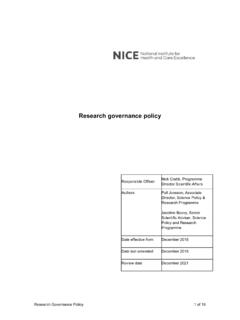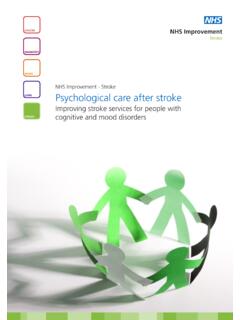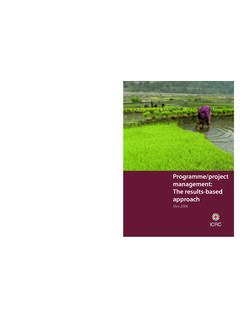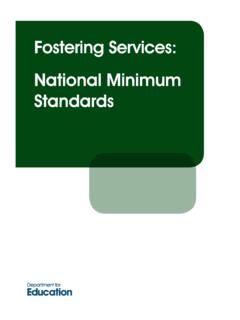Transcription of Principles for Best Practice in Clinical Audit - NICE | The …
1 Principles for best Practice in Clinical Audit Radcliffe Medical Press Radcliffe Medical Press Ltd 18 Marcham Road Abingdon Oxon OX14 1AA. United Kingdom The Radcliffe Medical Press electronic catalogue and online ordering facility. Direct sales to anywhere in the world. # 2002 national institute for Clinical excellence All rights reserved. This material may be freely reproduced for educational and not for pro t purposes within the NHS. No reproduction by or for commercial organisations is permitted without the express written permission of nice . British Library Cataloguing in Publication Data A catalogue record for this book is available from the British Library. ISBN 1 85775 976 1. Typeset by Aarontype Ltd, Easton, Bristol Printed and bound by TJ International Ltd, Padstow, Cornwall Contents Contributing authors iv Acknowledgements v Foreword vi Clinical Audit in the NHS: a statement from the national viii institute for Clinical excellence Introduction: using the method, creating the environment 1.
2 Stage One: preparing for Audit 9. Stage Two: selecting criteria 21. Stage Three: measuring level of performance 33. Stage Four: making improvements 47. Stage Five: sustaining improvement 59. Appendix I: glossary 69. Appendix II: online resources for Clinical Audit 73. Appendix III: national Audit projects sponsored by the 93. national institute for Clinical excellence Appendix IV: further reading 97. Appendix V: key points and key notes 101. Appendix VI: checklists 105. Appendix VII: approach to examining Clinical Audit during a Clinical 115. governance review used by the Commission for Health Improvement Appendix VIII: recommendations from the Report of the Public 119. Inquiry into Children's Heart Surgery at the Bristol Royal In rmary 1984^1995 (2001) and the Government's response (2002). Appendix IX: lessons learnt from the national Sentinel Audit 125. Programme Appendix X: list of desirable characteristics of review criteria 131.
3 Appendix XI: review of the evidence 133. Index 191. Contributing authors Royal College of Nursing 20 Cavendish Square London, W1G 0RN. Ross Scrivener, Information Manager, Quality Improvement Programme RCN institute Radcliffe In rmary Oxford, OX2 6HE. Clare Morrell, Senior Research and Development Fellow, Quality Improvement Programme Clinical Governance Research and Development Unit Department of General Practice and Primary Health Care University of Leicester Leicester General Hospital Gwendolen Road Leicester, LE5 4PW. Richard Baker, Professor and Director Sarah Redsell, Senior Lecturer Elizabeth Shaw, Research Associate Keith Stevenson, Lecturer national institute for Clinical excellence 11 Strand London, WC2N 5HR. David Pink, Audit Programme Director Nicki Bromwich, Audit Development Manager Acknowledgements The preparation of this book was funded by the national institute for Clinical Excel- lence.
4 We would like to thank Steve Barrett and Paul Sin eld formerly of CGRDU, Leicester, for assistance in the early stages of the literature review, and Laura Price, for her work in editing the text of the book. Finally, we thank all those too numerous to mention by name who reviewed the book during its development. Foreword The time has come for everyone in the NHS to take Clinical Audit very seriously. Anything less would miss the opportunity we now have to re-establish the con dence and trust upon which the NHS is founded. Public and professional belief in the essential quality of Clinical care has been hit hard in recent years, not least by a number of highly public failures. We can no longer think about effectiveness of care as an isolated professional matter. Clinical govern- ance is the organisational approach for quality that integrates the perspectives of staff, patients and their carers, and those charged with managing our health service.
5 But real commitment is needed from everyone involved if governance is to ful l its promise. Concerns about the quality of NHS care have attracted national publicity, public inquiries and a focus on failure. While we must do everything we can to put in place systems to avoid such failings in future, these isolated cases should not dominate our thinking about quality of care. It is just as important that Clinical governance should support a process of continuous quality improvement throughout the NHS. Clinical Audit is at the heart of Clinical governance.. It provides the mechanisms for reviewing the quality of everyday care provided to patients with common conditions like asthma or diabetes.. It builds on a long history of doctors, nurses and other healthcare professionals reviewing case notes and seeking ways to serve their patients better.. It addresses quality issues systematically and explicitly, providing reliable infor- mation.
6 It can con rm the quality of Clinical services and highlight the need for improve- ment. This book provides clear statements of principle about Clinical Audit in the NHS. The authors have reviewed the literature concerned with the development of Audit over recent years, and are able to speak about Clinical Audit with considerable personal authority. Too often in the past local and national Clinical audits have failed to bring about change. The Report of the Public Inquiry into Children's Heart Surgery at the Bristol Royal In rmary 1984 1995 (2001) provides salutary reading for anyone in the NHS. who is still inclined to dismiss the importance of Clinical Audit . But Audit cannot be FOREWORD vii expected to bear fruit unless it takes place within a supportive organisation committed to a mature approach to Clinical quality Clinical governance. Clinical Audit does not provide a straightforward or guaranteed solution for each problem.
7 Local Audit programmes in primary and secondary care will need to use the Principles set out in this book to devise and agree local programmes tailored to address local issues. Nevertheless, we hope you will nd that the distillation of evidence and wisdom about Audit presented in this book will help you to create Audit programmes that are capable of bringing about real improvements. The national institute for Clinical excellence and the Commission for Health Improvement will each have an important part to play in setting the national context within which the NHS addresses the need to review the quality of healthcare. But the real worth of Clinical Audit will depend on the commitment of local NHS staff and organisations. We hope that this book will help provide a framework for Clinical Audit that maximises local enthusiasm and commitment to high-quality patient care. Dame Deirdre Hine Sir Michael Rawlins Chair Chairman Commission for Health Improvement national institute for Clinical excellence Clinical Audit in the NHS: a statement from the national institute for Clinical excellence The Clinical Audit challenge facing the NHS.
8 The NHS needs to change its approach to Clinical Audit , and this book sets out the Principles that should guide those changes. There have been signi cant shifts in society's attitude to quality in healthcare over recent years, culminating in the introduction of Clinical governance for the NHS. As part of local arrangements for Clinical governance, all NHS organisations are required to have a comprehensive programme of quality improvement activity that includes clinicians participating fully in Audit . Clinical Audit is the component of clin- ical governance that offers the greatest potential to assess the quality of care routinely provided for NHS users Audit should therefore be at the very heart of Clinical gov- ernance systems. For Clinical Audit to become an important component of how we manage our health services a very real change needs to take place in the standing of Audit programmes within the NHS.
9 Audit can no longer be seen as a fringe activity for enthusiasts . within Clinical governance, the NHS needs to make a commitment to support Audit as a mainstream activity. Issues needing attention In this book the authors set out two key areas for attention if Audit is to play a part in bringing about real improvements in quality of care. First, efforts must be made to ensure that the NHS creates the local environment for Audit . Second, the NHS. needs to make sure that it uses Audit methods that are most likely to lead to Audit projects that result in real improvements. Both areas deserve serious attention at all Clinical Audit IN THE NHS ix levels in the NHS and Audit programmes are unlikely to be successful if NHS staff nd themselves struggling with Audit in the absence of appropriate methods and a supportive environment. A mixed record for Audit Clinical Audit has a mixed history in the NHS, and for every success story there are just as many projects that have run into the ground without demonstrating any signi cant contribution to quality of services.
10 Many of Audit 's early adopters have lost the enthusiasm they once had. This legacy needs to be addressed if individuals and teams are to re-engage their hearts and minds in Clinical Audit . Many Audit projects have oundered as a result of poor project design. Problems with Clinical data have been particularly common. Data have often been of poor quality and inaccessible, or alternatively have been collected because of administrative convenience even where they are not accepted as relevant measures of Clinical quality. In many cases the dataset has been simply too large to be workable within a busy Clinical service weighed down with other priorities. Many projects have been poorly managed, inadequately carried out, or both. Change in complex healthcare systems cannot be brought about simply by the analysis of data that indicate that care might be less than perfect. The management of change is often more challenging than the Clinical issues addressed by Audit , but all too often the change agenda has been left in the inexperienced hands of junior staff, without appropriate support.













